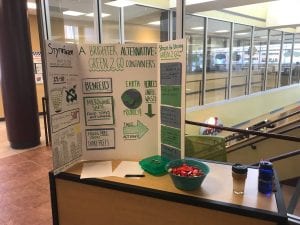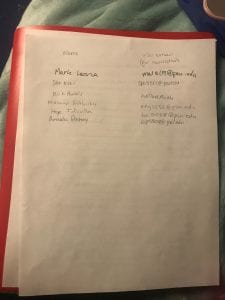For my Advocacy Project I advocated for Green2Gos. I attached some pictures here to show the table I had, some pictures of the pledge students signed, and a video attached that shows a conversation with 2 students and a presentation I gave at a student council meeting.





My pledge says: “I will do my best to reduce my food waste on and off campus by not taking more than I need and saving my leftovers in a Green2Go. I pledge to avoid disposable items and instead use reusable utensils and Green2Gos to reduce my waste. *write your email if you want to be signed up for Mainstream: Penn State’s Sustainability Newsletter*”




I attached a link to a video showing me advocating at Redifer and at Schreyer Honors College Student Council.
I attended a deliberation on 2/21 for Beth Parfitt’s class. My friend was on the deliberation team, so I wanted to go to her event and participate. It was about abortions on the basis of down syndrome testing. This deliberation was set up very differently than our deliberation. It took place in a classroom during class time, which I think made it difficult for students to show up to. However, it was a very interesting topic and I was excited to attend.
I believe only me and another person were able to show up because it was during class time, however I enjoyed the conversation. I feel like I participated a lot because me and the other girl were the only ones not in the class nor part of the deliberation team. However, I got some really interesting perspectives, and I feel that this issue is more of an ethical issue than my deliberation was (binge-drinking). I feel that most people have differing opinions on abortion, while not many people have differing opinions on binge-drinking (although there are plenty of differing opinions on how to approach it).
One of the things that was most interesting to me was the assumptions that people brought to the table. One girl said that a “perfect society” was one where no one had disabilities. However, I’m not sure that I agree. I understand that no one wants to be disabled and that disabilities (physical or mental) can be straining and difficult. However, I do not think it’s ethical to say that (essentially) getting rid of disabilities is the way to make our society better. I think that we learn a lot from hardships and from people who experience life differently than the average person. So I think that this conversation came from a perspective with the assumption that people with down syndrome are bad and unwanted.
I think that there were a couple of really interesting arguments made about how aborting on the basis of down syndrome sets a precedent for aborting for any reason. So if we allow abortions for down syndrome testing, why not allow abortions for those that cannot afford a child and then so on and so forth. Eventually it’s possible that abortions are legal for any reason. (That may be a good or bad thing depending on one’s views). I also think that there could be a precedent set of NOT allowing an abortion on the basis of down syndrome, ultimately leading to abortions in general becoming illegal. If you can’t allow an abortion on the basis of down syndrome, can you allow an abortion on the basis of other disabilities? What about monetary reasons?
I think what separates abortion on the basis of down syndrome from other reasons is the question of the quality of life for the child. It was a really interesting discussion to try to gauge the quality of life for someone with down syndrome, and how that differs from other situations in which a parent may consider abortion.
On February 22 I went to Jonathan Haidt’s talk “What Capitalism Does for Us and to Us.” He spoke at the Business Building tailoring his conversation to business students. Jonathan Haidt is a social psychologist and Professor of Ethical Leadership at New York University’s Stern School of Business. He focuses on the psychology of morality and moral emotions.
Haidt talked about the discrepancies in how people view capitalism. As he explained, many people view capitalism as a giant vampire squid (complete with pictures), however others view capitalism and the most amazing part of America. Some people think that trade teaches everyone to be the same. According to Haidt, Industrial Revolution creates more prosperity, and the United States middle class helped create our economic system. Haidt mentioned how in the free market, you can usually only win by making other people better off. He said that capitalism was not evil.
Haidt discussed the differences between communism and capitalism in a “1948 experiment” which was when North Korea was founded. Haidt compared the prosperity of North Korea and South Korea, showing that capitalism was more prosperous than communism.
Another interesting topic that Haidt discussed was happiness. He said that GDP per capita is the best predictor of a country’s happiness. (Later he says that more money doesn’t always make someone happier, which does not agree with this point. During the questions section someone pointed this out and he said that he had never realized that contradiction before.)
According to Haidt, America is more divided now than during the civil War. He said the political gap is 36 points in 2017 while it was 15 during the 1900’s. This is a huge jump between those two time periods, showing how much America’s politics have changed over the years.
Haidt discussed tame and wicked problems: tame problems are like cholera where people can work on them meanwhile wicked problems are difficult and everyone thinks differently about it. The right knows the answer to our economic problems: lower taxes while the left also knows the answer: no more racism (although racism should end, that isn’t what the left thinks the answer is exactly to our economic problems…but that’s how Jonathan Haidt worded it). Wicked problems can only be defined by the background of people’s values. So it’s important to have diversity in values which leads to political diversity. Through this people can argue their way to a solution, instead of immediately agreeing with their partners and not finding the best solution. Haidt believes that people can only solve problems if they’re on different teams because there is some truth to both sides.
Haidt had a very interesting talk, although I did not agree with everything he said. I do think that it’s necessary to have diversity of thought, but I think that he was a little too nice to capitalism than need be. I don’t think he talked about the downfalls of capitalism, and failing to recognize its faults means a failure to fix our economic system. I think that capitalism could be improved upon if we focused on what its problems are, and that could help make all of America more prosperous.
Unfortunately this weekend I did not bake. My parents came up to visit on Sunday and I was busy on Saturday. However, I am planning on baking cookies this Thursday to thank my friend’s family for being so kind to let me visit in Virginia. However, that will be too late for me to blog about. So I wanted to reflect on this blog, and look at how baking has affected my freshman year.
I’ve always enjoyed baking, but towards the end of high school and especially now, baking has become an important part of my identity. I ran into one of my friends and one of his friends at the HUB this weekend, and his friend said, “you’re the girl who made the amazing cookies! Please let me know the next time you bake!” He remembered that, even though I haven’t baked cookies for weeks.
I’ve also learned that baking can help when I’m stressed or upset, but I can also get stressed about baking. When I make baking an assignment, like I tended to do with these blogs, I would get stressed and not want to do it. But over winter and spring break I’ve noticed that I wanted to bake more since I wasn’t baking to write a blog about it, but to have fun and share food with other people.
I want to encourage everyone to find something that they’re passionate about. People can hate baking and that’s totally okay, but maybe someone is passionate about sewing or knitting or painting or reading; the list goes on and on. There are so many activities to learn and pursue, and I really recommend finding something that’s fun, and a great way to relieve stress. I’ve found that I like baking so much because I can give back to others, and I think sewing knitting or even painting has that same effect! Reading can also spark interesting conversations and start new friendships.
I was having a conversation with a friend yesterday who is going through a breakup. He said that he wanted someone as a support system or someone to be there for him. But I think that that passion can be redirected to a hobby like baking or sewing or painting, instead of relying on someone else to make him happy. Ultimately, I think that we should do what makes us happy, and I highly encourage everyone to find what hobby that is!








